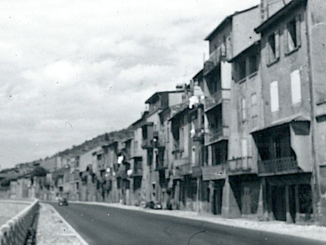In 1955, at the height of the Mau Mau Rebellion, my uncle John Alldridge produced a series of reports from Kenya for the Birmingham Mail and the Manchester Evening News – Jerry F
Nairobi
With the exception of Mau Mau itself, nothing in this troubled colony of Kenya has shocked and bewildered the British public more than those allegations of corruption and malpractice levelled against the Kenya Police.
A police inspector found guilty of perjury; constables taking bribes as a matter of course; prisoners ill-treated while under arrest — these things have baffled the understanding of a law-abiding people brought up in the belief that the sight of a policeman on his beat is a sure sign of law and order.
To get this depressing business into its proper perspective you must understand two things:
Firstly, you are dealing with a country under martial law, a country which for three unhappy years has been virtually a police state, where one European male in five is a policeman.
Secondly, you are seven thousand miles away from the village bobby, the guide, philosopher, and friend of all in his quiet, peace-loving community.
You are in the middle of a dark continent, socially advanced no farther than the thirteenth century, where the police askari in his short blue jersey and red fez is too often a symbol of suspicion and distrust.
“Rather admit leprosy to your house than a policeman” is a Kikuyu proverb. There are many in the same theme.
Only now are we beginning to realise how nearly the Mau Mau rising came to being the torch that would have set off the powder magazine that is Africa. A little more patience, better coordination between its leaders, and Mau Mau could have swept every white man out of Kenya in a matter of weeks.
Mercifully, the pistol went off at half-cock. The sparks were stamped out in time. And for that you have to thank the Kenya Police and its auxiliary, the Kenya Police Reserve, badly led, badly armed, hopelessly outnumbered though they were. It is well to remember that.
The incredible thing is that although the seeds of Mau Mau were planted long ago, there seems no indication that those in authority here in Nairobi were ever aware of it; or if they were, ever faced up to the grim possibilities.
In 1952, only a few weeks before the first sinister rumblings, the total establishment of the Kenya Police stood at 300 Europeans, 95 Asians, and 7,238 Africans — a force of under 8,000 regular policemen to maintain order in a country about the size of England and Wales, where a million Africans were in a state of ferment.
For years before the emergency this small force had been starved of almost all it needed in material and manpower. Suddenly, without warning, it was thrown headlong into what could have been a full-scale civil war. It was the old story of too little and too late: Malaya all over again.
What happened then was a perfect example of triumphant British muddling through. The Kenya Police Reserve was called out — a special constabulary paid a small duty allowance and placed on full-time footing.
It had no standard equipment, hardly any transport, no standing orders, no overall plan of campaign. Commanding it was a tight little corps of retired Regular Army officers, of whom there are many in Kenya.
In effect, this was not a police force at all. If it resembled anything it was a huge and slap-happy sheriff’s posse of deputies waiting for the Redskins to attack.
Working with this European force, regular and volunteers, were new drafts of African askaris, recruited from the trustworthy provinces and thrown into action, sometimes with less than a fortnight’s training.
It was this determined, ill-disciplined security force which held the line in the worst days of ’53 and ’54.
Excesses there certainly were — though I am inclined to believe that they were exaggerated and very largely the work of the much-tried Kikuyu Guard who, heaven knows, had enough cause for retaliation against their own kind.
But this, after all, was not a street-brawl: it was the beginning of a bloody civil war. And anyone who has seen photographs of the atrocities committed by Mau Mau — as I have — can understand with a shudder the savage temper of those dreadful days and nights.
All this time the regular Kenya Police force was being expanded. To assist it there arrived from home reinforcements of young European inspectors, ex-Army and Air Force N.C.O.’s for the most part, tempted to Kenya by a two-year contract that offered them financial rewards and a social status they could never have enjoyed in Britain.
Considering that they, too, were thrown into the battle ill-equipped, with the minimum of training, knowing nothing of the country or its language, they made a fine showing.
Too often a couple of these young rookies would be sent into a trouble area to take over a force of 20 African policemen. With no instruction book to guide them — the new standing orders of the Kenya Police are still being rewritten — they had first to build their own mud-and-wattle police station, then to instil discipline into a raw unit by sign language and a few words of Swahili.
I have visited many of these temporary police stations. Officered by young inspectors still in their early twenties, they are as neat and trim and every bit as prosaic as any sub-police station at home.
But I was seeing them after the regular police force had been largely reconstructed: after the elderly Colonel Blimps had been tactfully removed and they had begun to get those essentials which they so badly needed — transport, radio, uniform.
The finest tribute to these young “temporaries,” doing their best under dreadful difficulties, was paid by a former Commissioner, Colonel Arthur Young. Praising the work of one young contract inspector, he said:
“This young man…was in the space of two months responsible for the investigation of more capital crimes than occur in two years in Greater London — crimes which in London are investigated by all the skill, experience, and resources of Scotland Yard and its specialist officers.
Now the “shooting war” is over, and the Kenya Police, expanded to 12,000 regulars and 10,000 auxiliaries (which includes a small but highly flexible air wing), settles down to keep the uneasy peace.
I wish I could say that all is now well with this much-tried, much-abused police force. Unhappily, it doesn’t take long to detect the note of frustration running right through the force. In 12 months it has had three commissioners. That tells its own story.
As one high-ranking officer put it to me: “What we need more than anything else out here is a sense of security and stability. We need confidence in ourselves and in our leaders.
“We want to know at least where we’re going. That doesn’t seem much to ask. But at the moment we can’t even be sure that we have our own government behind us.”
Battling stubbornly for recognition of these things is the present Commissioner, Mr. Richard C. Catling, O.B.E.

Unknown photographer – © Newspapers.com, reproduced with permission
Catling, a small bulldog of a man who looks not unlike Don Bradman, has spent most of his 20 years as a policeman grappling with “emergencies.”
He has faced the terrorist in Palestine — he was in the King David Hotel when it was blown up in 1946 — and in Malaya.
One lesson he has brought with him to Kenya: “You can operate by fear, but it doesn’t get you very far in the end.”
Fear must be replaced by respect, he insists. And to earn that respect, says Catling, you must fight clean.
Since Commissioner Catling took over at the end of last year there has been a marked improvement in the discipline of all ranks of the Kenya Police. With the old-time “vigilante” Catling is ruthless.
“We can’t afford any longer to have slack discipline,” he will tell you. “It’s time we all reminded ourselves that the law is the same for everybody.”
Looking around his force, Catling sees much to cheer him. “I believe that, given reasonable support by the Government, in time the Kenya Police can be made a very, very fine organisation,” he sums up, cautiously.
For there are many things that worry him — not least the 70,000 Mau Mau suspects, of all shades from black to light grey, still interned in so-called rehabilitation camps.
“You never cured any man by putting him behind wire,” is another axiom Catling brought from Malaya.
He would like to see more of his promising contract inspectors signing up for regular service with the police.
And, like every officer in his force, I feel, he needs to be sure that he has the confidence and support of his Government.
Catling has done much for the Kenya Police. His contract inspectors now do a three-month intensive training course at Nyeri before going to an outstation. His new special branch has reduced crime in Nairobi, hotbed of Mau Mau, to its lowest figure for ten years.
But it is my guess that he will not be out here much longer.
If that proves to be the case, it will be a poor lookout for the Kenya Police.
And, in the long run, a poor lookout for Kenya.
Reproduced with permission
© 2024 Newspapers.com
For more about Richard Catling, see https://en.wikipedia.org/wiki/Richard_Catling
© 2024 Newspapers.com
Jerry F 2024



